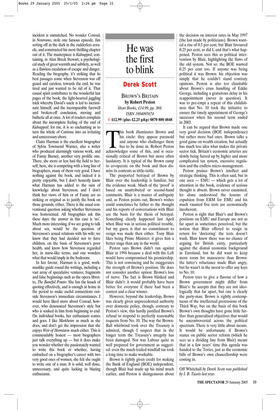He was the first to blink
Derek Scott
BROWN’S BRITAIN by Robert Peston Short Books, £14.99, pp. 369, ISBN 1904095674 ✆ £12.99 (plus £2.25 p&p) 0870 800 4848 This book illuminates Brown and his circle: they appear paranoid and anyone who challenges them has to be done in. Robert Peston acknowledges some of this, and is occasionally critical of Brown but more often laudatory. It is typical of the Brown camp to co-operate on the book and then dismiss its contents as tittle-tattle.
The purported betrayal of Brown by Blair over the leadership is familiar, but the evidence weak. Much of the ‘proof’ is based on unattributed or second-hand comments. Blair is a master of ambiguity and, as Peston points out, Brown’s wishes could sometimes be father to the thought and his reports of conversations with Blair are the basis for the thesis of betrayal. Something clearly happened last April when Blair was in serious political trouble, but my guess is that no commitment to resign was made then either. Tony Blair likes being Prime Minister: it gives him a better stage than any in the world.
Peston says Brown didn’t run against Blair in 1994 because a deal with the Left would have compromised his premiership. This is not convincing and he exaggerates the strength of Brown’s position. He does not consider another option: Brown’s loss of nerve. The fact is Brown blinked and Blair didn’t: it would probably have been better for everyone if there had been a contest and a clear winner.
However, beyond the leadership, Brown was clearly given unprecedented authority over domestic policy, though, contrary to Peston’s view, this hardly justified Brown’s refusal to respond to perfectly reasonable requests from No. 10. The way the BrownBall whirlwind took over the Treasury is admired, though I suspect that in the longer term the Treasury’s integrity has been damaged. Nor was Labour quite as well prepared for government as suggested: even the much-trailed windfall tax took a long time to make workable.
Brown is rightly given credit for making the Bank of England (BOE) independent, though Blair had made up his mind much earlier, and Peston is disingenuous about the decision on interest rates in May 1997 (the last made by politicians). Brown wanted a rise of 0.5 per cent, but Blair favoured 0.25 per cent, as did I, and that’s what happened. Peston sees this as political intervention by Blair, highlighting the flaws of the old system. Not so: the BOE wanted 0.25 per cent too. If anyone was being political it was Brown: his objection was simply that he couldn’t stand contrary opinions. Peston is also too charitable about Brown’s crass handling of Eddie George, including a gratuitous delay in his reappointment (never in question). It was to pre-empt a repeat of this childishness that No. 10 took the initiative to ensure the timely appointment of George’s successor when his second term ended in 2003.
It can be argued that Brown made one very good decision (BOE independence) but rather more bad ones. Brown talks a good game on wealth creation, but actually has much less idea what makes the private sector tick. Britain’s economic arteries are slowly being furred up by higher and more complicated tax system, excessive regulation and the endless micro-management.
Peston praises Brown’s intellect and strategic thinking. This is often said, but in one area — EMU — which gets a lot of attention in the book, evidence of serious thought is absent. Brown never examined, let alone understood the lessons of expulsion from ERM for EMU and his much vaunted five tests are economically incoherent.
Peston is right that Blair’s and Brown’s positions on EMU and Europe are not as far apart as sometimes perceived, but the notion that Blair offered to resign in return for ‘doctoring’ the tests doesn’t wash. Blair knew there was no chance of arguing for British entry, particularly against the dismal economic background in Euroland, but he did want to keep more room for manoeuvre than Brown: the latter’s reluctance made Blair angry, but he wasn’t in the mood to offer any keys to No. 10.
Peston tries to give a flavour of how a Brown government might differ from Blair’s: he accepts that they are not ideologically that far apart, but one is clearly the party-man. Brown is rightly contemptuous of the intellectual pretensions of the Third Way, but on the basis of this book Brown’s own thoughts have gone little further than generalised objectives that would be uncontroversial across the political spectrum. There is very little about means. It would be unfortunate if Brown’s stance on public sector reform (which he sees as a dividing line from Blair) meant that in a few years’ time this agenda was handed to the Tories, just as the economic bills of Brown’s own chancellorship were coming in.
Off Whitehall by Derek Scott was published by I. B. Tauris last year.















































 Previous page
Previous page